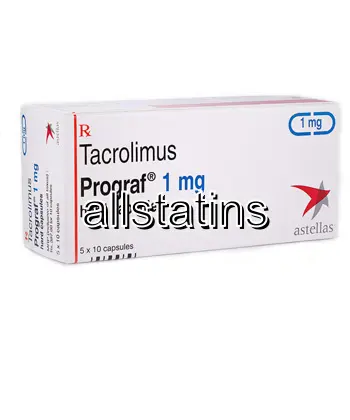| Package | Dosage | Price | Price per Dose | |
|---|---|---|---|---|
| Dosage: 0,5mg | ||||
| 90 pill | 0,5mg | $638.65 | $7.09 | |
| 60 pill | 0,5mg | $453.86 | $7.57 | |
| 30 pill | 0,5mg | $252.94 | $8.43 | |
| 20 pill | 0,5mg | $177.59 | $8.88 | |
| 10 pill | 0,5mg | $95.06 | $9.58 | |
| Dosage: 1mg | ||||
| 90 pill | 1mg | $896.98 | $9.97 | |
| 60 pill | 1mg | $642.23 | $10.71 | |
| 30 pill | 1mg | $378.52 | $12.59 | |
| 20 pill | 1mg | $281.64 | $14.06 | |
| 10 pill | 1mg | $157.85 | $15.86 | |
| Dosage: 5mg | ||||
| 20 pill | 5mg | $855.72 | $42.75 | |
| 10 pill | 5mg | $478.98 | $47.88 | |

Prograf Description
Overview of Prograf
Prograf, known generically as tacrolimus, is a potent immunosuppressant commonly prescribed to prevent organ rejection in transplant patients. It works by suppressing the immune system’s response, helping the body accept a transplanted organ such as a kidney, liver, or heart. In the United States, it is available by prescription through licensed pharmacies, including online platforms, ensuring convenience for patients managing complex treatment schedules.
How to Use Prograf
This medication is typically taken orally, either as a capsule or liquid, once or twice daily. It is crucial to follow your healthcare provider’s instructions regarding dosage and timing. Consistency is key in maintaining effective drug levels in your system. Patients should avoid missing doses and should never adjust their dose without consulting their doctor. Regular blood tests will be necessary to monitor tacrolimus levels and assess kidney function to prevent toxicity or rejection episodes.
Effectiveness and Patient Reviews
Many patients in the US report that Prograf effectively prevents organ rejection when used as prescribed. It has a well-established track record in transplant medicine. Patients appreciate the convenience of once or twice daily dosing compared to older regimens that required more frequent dosing. However, some reviews mention ongoing side effects, which are common with any immunosuppressant. Most users find that with proper medical supervision, the benefits outweigh the drawbacks of potential adverse effects.
Possible Side Effects and Risks
As with other immunosuppressants, Prograf can cause a range of side effects. Common issues include headaches, tremors, nausea, and increased susceptibility to infections. More severe but less frequent adverse effects can involve kidney damage, hypertension, or neurological effects. Patients are advised to report any unusual symptoms to their healthcare provider promptly. Long-term use necessitates regular monitoring to mitigate risks such as toxicity or secondary complications like diabetes or high cholesterol.
Availability and Considerations in the US
In the United States, Prograf is available through licensed online pharmacies, which often require a valid prescription and physician consultation. It’s crucial to purchase from reputable sources to ensure the medication's quality and safety. Online platforms often provide detailed instructions for use and support to help patients manage their treatment effectively. However, patients must remember that this medication requires close medical supervision due to its potent immunosuppressive effects.
Final Thoughts
Prograf remains a cornerstone in transplant medicine, offering effective prevention of organ rejection. While it can be used conveniently through online pharmacies for patients in the US, careful adherence to medical advice is vital. Understanding the potential side effects and the importance of regular monitoring can help optimize treatment outcomes. Overall, for transplant recipients, Prograf provides a reliable way to protect their new organ while maintaining quality of life.